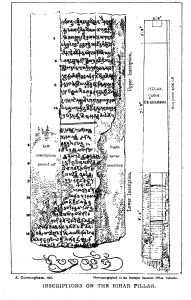
Bihar Sharif (Bihar). Inscribed pillar now in the Patna Museum, drawing by Cunningham ASIR 1 (1871): plate XVII.
| Metadata | |
|---|---|
| Object ID | OB00043 |
| Title | Bihar Sharif Pillar |
| Subtitle | |
| Inscription(s) | IN00047 IN00048 |
| Child Object | |
| Parent Object | |
| Related Objects | |
| Responsibility | |
| Author | |
| Metadata recorded by | Dániel Balogh |
| Authority for metadata | |
| Metadata improved by | Dániel Balogh |
| Authoriy for improved | |
| Description | |
| Material | Stone / sandstone |
| Object Type | Pillar |
| Dimensions: | |
| Width | ~60 |
| Height | 434 |
| Depth | ~60 |
| Weight | |
| Details | Red sandstone. No detailed description of the column is available; the information here has been gleaned from Plate XVII in ASIR 01. The bottom of the pillar is broken off. The extant lower portion is octagonal and 175 cm long; above this there is an apparently circular shaft 221 cm long, followed by a square section (unless this bit is circular too) for a further 38 cm. |
| History | |
| Created: | |
| Date | |
| Place | Bihar Sharif |
| Other ancient history | |
| Found: | |
| Date | |
| Place | |
| Other modern history | |
| Latest: | |
| Date | 1980 |
| Place | Patna Museum |
| Authority | Goyal, S. R. (1980). 'Bihar Stone Pillar Inscriptions of the Imperial Guptas.' Journal of the Epigraphical Society of India, 7, pp. 49-53. |
| Details | Discovered by E. L. Ravenshaw in 1839, at which time it was installed upside down on high ground a little to the west of the northern gate of the fort of Bihar (present Bihar Sharif). He was told that it had been moved here from in front of the same gate. Cunningham (in the early 1860's?) found it fallen where Ravenshaw had seen it erect. In 1871 it was moved in front of the Bihar Court House by A. M. Broadley, who is also responsible for a number of crude English inscriptions on the faces of the pillar not inscribed in antiquity (reported in ASIR 11: 192-193). It was subsequently used to support the roof of a house built up around it. At this time it was still installed upside down, with the bottom (current top) 8 lines completely hidden by woodwork. These used to be only available in Mitra's and Cunningham's eye copies. In 1927 the pillar was moved to the Patna Museum. |
| Notes | |